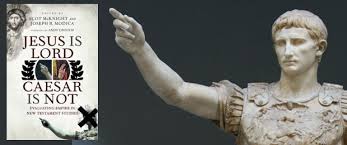In this book, Acts is dealt with separately from Luke’s Gospel, though it may be doubted this was a good idea, since the vast majority of scholars think the same person wrote both books, and it would have been good if the case for anti-imperial rhetoric in the former volume was compared to the case in the latter volume. Certainly it is true, as D.J. Strait points out, that there were various cities visited by Paul and other early Christians, where there were inscriptions like this one found in Myra–“The people of Myra [honor] the Emperor Tiberius, the exalted god, son of exalted gods, lord of land and sea, the benefactor and savior of the entire world”. Whether the Myrans believed this hyperbolic rhetoric or not (and it should be noted that Tiberius rejected being worshipped) they did know who their benefactor was. But in fact as Strait points out ‘straitway’ it is not actually correct to speak monolithically of the Imperial cult, but rather of cults plural. There was a lot of diversity from one region to another, from one Emperor to another, from one city to another, and as Strait also says, we don’t know what city Theophilus lived in. The provenance of Acts is not clear (p. 133). And frankly it is not known to what degree the Imperial cult had become a dominant, never mind the dominant cult throughout the Roman Empire. Strait is right to correct N.T. Wright on this point. As he also says on the same page, it is not until Hadrian that Christians faced loyalty tests at the hands of Roman officials like Pliny.
As Strait says, some scholars have made a lot out of Luke’s ascension narratives, comparing them to apotheosis stories about the Emperor. As he adds (p. 135) an Emperor had to get Senate vote to be considered this way, and it was based on the Emperor’s behavior. The opposite of this is depicted in Seneca’s satire on Claudius, where the Emperor is banished from heaven to the underworld for his tyrannical behavior! Need it be said that there is no casting of lots by the apostles to decide about Jesus’ ascent, nor a vote on his behavior! Furthermore, the angels go on to tell the disciples that Jesus will be coming back, so they need to get on with the mission job.
Strait goes on to point out (p. 137) that it seems strange that in Acts Jesus is only called Savior in Jewish contexts where salvation history is at issue, if the point was to contrast him with claims about the Emperor.
A much better case has been made by Kavin Rowe in regard to Acts 10.36. Here we have a centurion in his home, so one can argue it is a Roman context, and Peter is telling him that Christ is Lord of all. Rowe points out that this claim of being ‘lord of all’ is made about Caesar, and he couples this by stressing this story transpires in Caesara Maritima where there was a large temple to Augustus. To this point Strait is able to add that the peace Christ offers can be compared to the pax Romana that the centurion would have been bound to uphold. Now Acts 10 is a conversion story, not a story about adherence to or offering sacrifices in the imperial cult. Thus what one can say about this text is that the hyperbolic rhetoric of the Emperor cult may be indirectly critiqued here. The issue here then would be idolatry, not the Emperor’s right to rule, or authority to do so. In other words, it would be a specific though indirect critique of the imperial cult saying Jesus is the true Lord of all, not Caesar. Jews were of course bound to reject divinity claims, especially totalizing ones of this sort, and Peter is no different. Note that Paul elsewhere in Acts takes no direct swipe at the imperial cult. Even when he is in Athens in Acts 17, he refers only to an altar to an unknown God, not stopping to critique the imperial cult there. But there was a Roma-Augusta temple near the Parthenon, near where Paul spoke in Athens. (see pp. 139-40). What about Acts 17.6-7 where we hear about Christians turning the world upside down, and violating the decrees of Caesar ‘saying there is another king, Jesus’. Here Christians are accused of anti-imperial cult rhetoric, but the accusation as Strait says is not by the governing authorities but by Jews trying to get Paul and his colleagues in hot water.
It cannot be incidental that Roman officials at every point along the way, when dealing with Paul the prisoner declare Paul has done nothing deserving death (Lysias, Festus,Agrippa II– Acts 23.29;25.25;26.31-32). This goes along with the positive portrayal elsewhere of Roman officials like Sergius Paulus, who seems to become a convert, and then there is Julian the centurion that protects Paul from being murdered. Thus at the end of the day even Kavin Rowe suggests that what Luke is advocating is a new culture, not a coup. It is not clear anyway that opposition to the imperial cult by Jewish Christians would have been seen as seditious or subversive anyway. They were not expected to worship the Emperor even after 70 A.D. when they were taxes. The interesting tale of the death of Herod Agrippa I (in Acts 12.2-3) a tale also told by Josephus is interesting and could be seen as an indirect critique of any sort of idolatry, in this case a human claiming to be the voice of God, but here again the person in question is a Jew or a Jewish Idumean, not a Roman. And it would appear Luke’s point is that God will take care of ruthless rulers that persecute Christians (in this case martyring James, and jailing Peter). This reflects the strong belief in the sovereignty of God, which, if taken seriously meant that one need not offer anti-imperial rhetoric in one’s writings— God would take care of such wicked person. And perhaps here is the point to note that in Revelation, where indeed there is a critique of the Emperor’s own idolatry as well as the problems with Rome itself, it is God alone who will be their judge. No human is capable or worthy of unsealing the seals, other than the exalted Jesus. Even verbal vengeance can be left in the hands of the exalted Christ. In short (p. 144), Luke does not openly critique Caesar, but of course he does critique idolatry in any form, by a Herod Antipas, and he would say the same about Caesar one would assume. But there is no direct reference to the imperial cult anywhere in Acts.












